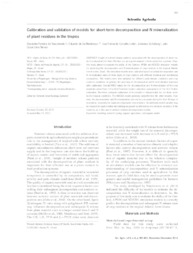Calibration and validation of models for short-term decomposition and N mineralization.
Calibration and validation of models for short-term decomposition and N mineralization.
Author(s): NASCIMENTO, A. F. do; MENDONÇA, E. de S.; LEITE, L. F. C.; SCHOLBERG, J.; NEVES, J. C. L.
Summary: Insight of nutrient release patterns associated with the decomposition of plant residues is important for their effective use as a green manure in food production systems. Thus, this study aimed to evaluate the ability of the Century, APSIM and NDICEA simulation models for predicting the decomposition and N mineralization of crop residues in the tropical Atlantic forest biome, Brazil. The simulation models were calibrated based on actual decomposition and N mineralization rates of three types of crop residues with different chemical and biochemical composition. The models were also validated for different pedo-climatic conditions and crop residues conditions. In general, the accuracy of decomposition and N mineralization improved after calibration. Overall RMSE values for the decomposition and N mineralization of the crop materials varied from 7.4 to 64.6 % before models calibration compared to 3.7 to 16.3 % after calibration. Therefore, adequate calibration of the models is indispensable for use them under humid tropical conditions. The NDICEA model generally outperformed the other models. However, the decomposition and N mineralization was not very accurate during the first 30 days of incubation, especially for easily decomposable crop residues. An additional model variable may be required to capture initial microbiological growth as affected by the moisture dynamics of the residues, as is the case in surface residues decomposition models
Publication year: 2012
Types of publication: Journal article
Unit: Embrapa Soils
Keywords: Modeling, Nutrient cycling, Organic agriculture, soil organic matter
Observation
Some of Embrapa's publications are published as ePub files. To read them, use or download one of the following free software options to your computer or mobile device. Android: Google Play Books; IOS: iBooks; Windows and Linux: Calibre.
Access other publications
Access the Agricultural Research Database (BDPA) to consult Embrapa's full library collection and records.
Visit Embrapa Bookstore to purchase books and other publications sold by Embrapa.

